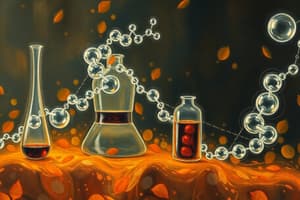Podcast
Questions and Answers
What are the two types of metabolism?
What are the two types of metabolism?
- Synthesis
- Hydrolytic
- Anabolic (correct)
- Catabolic (correct)
What is metabolism?
What is metabolism?
The sum total of all the biochemical reactions that take place in a living organism.
What metabolic pathways will be focused on in this module?
What metabolic pathways will be focused on in this module?
The citric acid cycle, the electron transport chain, and oxidative phosphorylation.
How much solid food and water does an average adult process in 40 years?
How much solid food and water does an average adult process in 40 years?
The human body needs a source of energy to make it ______
The human body needs a source of energy to make it ______
What is metabolism?
What is metabolism?
Which of the following best distinguishes anabolic from catabolic metabolism?
Which of the following best distinguishes anabolic from catabolic metabolism?
What are the key components involved in metabolic reactions?
What are the key components involved in metabolic reactions?
The Krebs Cycle is part of the _____ metabolic pathway.
The Krebs Cycle is part of the _____ metabolic pathway.
The human body requires energy to function.
The human body requires energy to function.
How much solid food does an average human adult process in 40 years?
How much solid food does an average human adult process in 40 years?
What type of metabolic pathway involves a series of consecutive biochemical reactions?
What type of metabolic pathway involves a series of consecutive biochemical reactions?
Flashcards are hidden until you start studying
Study Notes
Metabolism
- Metabolism is the sum of all biochemical reactions that occur in a living organism.
- Metabolism is responsible for the breakdown of food into energy and the building up of complex molecules.
- An average human adult processes 6 tons of solid food and 10,000 gallons of water over forty years.
- The body's composition remains essentially constant during this time.
- Metabolic pathways are a series of reactions that transform a starting material into an end product, which can be linear or cyclic.
- Common metabolic pathways include the citric acid cycle, electron transport chain, and oxidative phosphorylation.
Energy Production
- All living cells require energy to function, including processes like protein synthesis and membrane transport.
- The energy required by the body is provided by food.
- Cellular processes are fueled by various energy carriers, such as ATP (adenosine triphosphate).
Importance of Previous Knowledge
- Prior knowledge of basic biochemical concepts is essential for understanding metabolism.
- Understanding the structure and function of macromolecules: for example, carbohydrates, proteins, lipids, and nucleic acids, is necessary for exploring their roles in metabolism.
Metabolism
- Metabolism is the sum of all chemical reactions in a living organism.
- Metabolism involves converting food into energy and building cellular components.
- It is a complex and coordinated process involving many metabolic pathways.
- Human metabolism is essential for survival, enabling the body to maintain homeostasis.
- It involves both anabolic (building up) and catabolic (breaking down) processes.
Metabolic Pathways
- Metabolic pathways are a series of interconnected biochemical reactions that convert starting materials into end products.
- Pathways can be linear or cyclic.
- Each step in a pathway is catalyzed by a specific enzyme.
- The common metabolic pathway involves the citric acid cycle, the electron transport chain, and oxidative phosphorylation.
- Essential knowledge from previous modules forms the foundation for understanding metabolism.
Energy Production
- The human body requires energy for various functions, including protein synthesis, DNA replication, and membrane transport.
- Cellular respiration is the process of breaking down glucose to produce energy in the form of ATP.
- It involves four main stages: glycolysis, pyruvate oxidation, the citric acid cycle, and oxidative phosphorylation.
Importance of Metabolism
- Metabolism is essential for maintaining life, energy production, and growth.
- It underpins vital processes, including the breakdown of food for energy, the synthesis of essential molecules, and the removal of waste products.
- Understanding metabolism is key to understanding how the human body functions and how to maintain health.
Studying That Suits You
Use AI to generate personalized quizzes and flashcards to suit your learning preferences.




